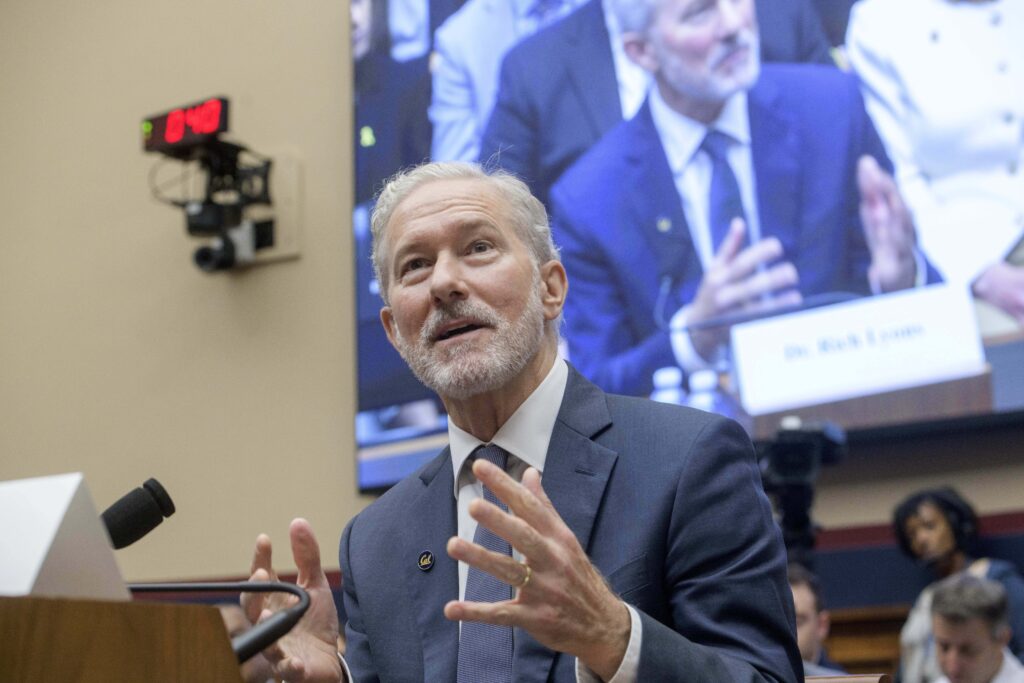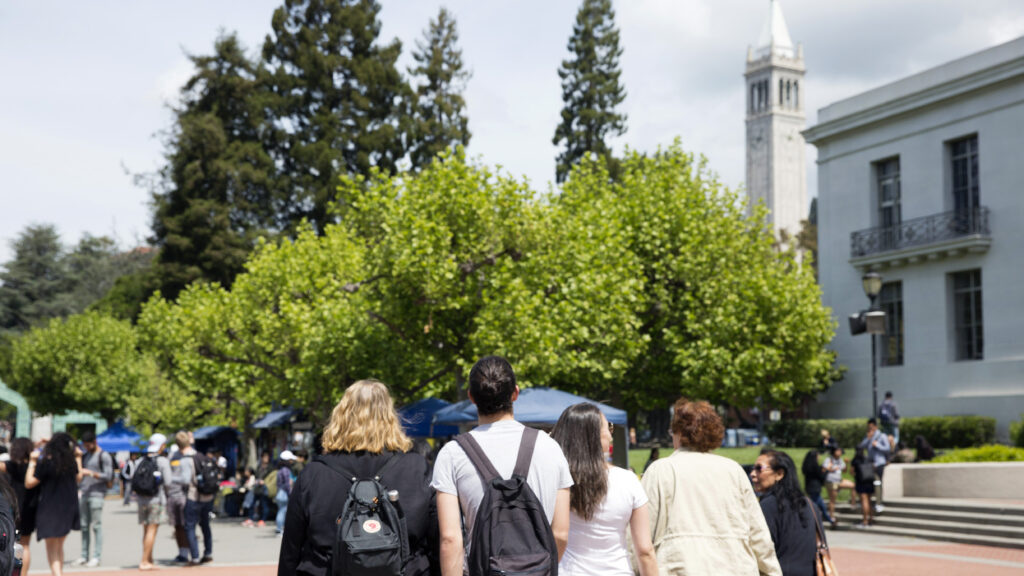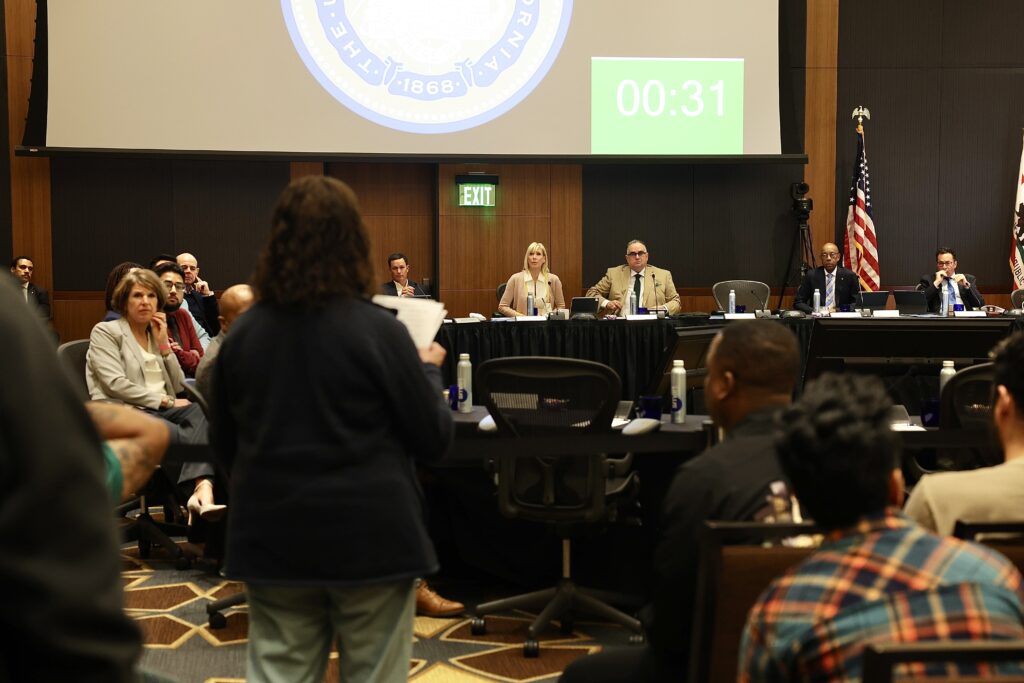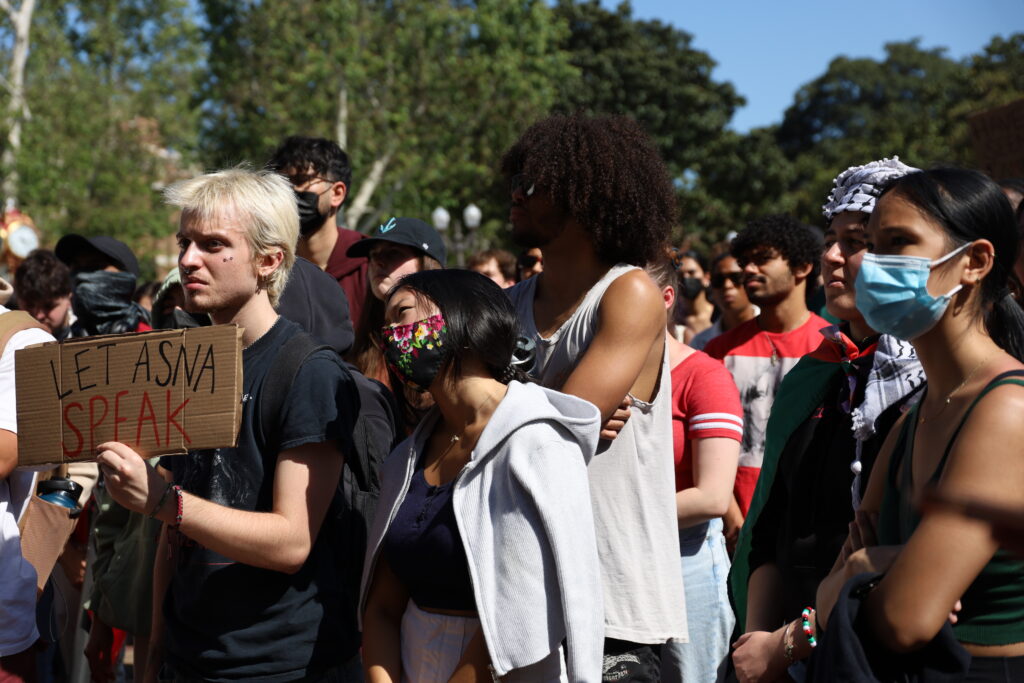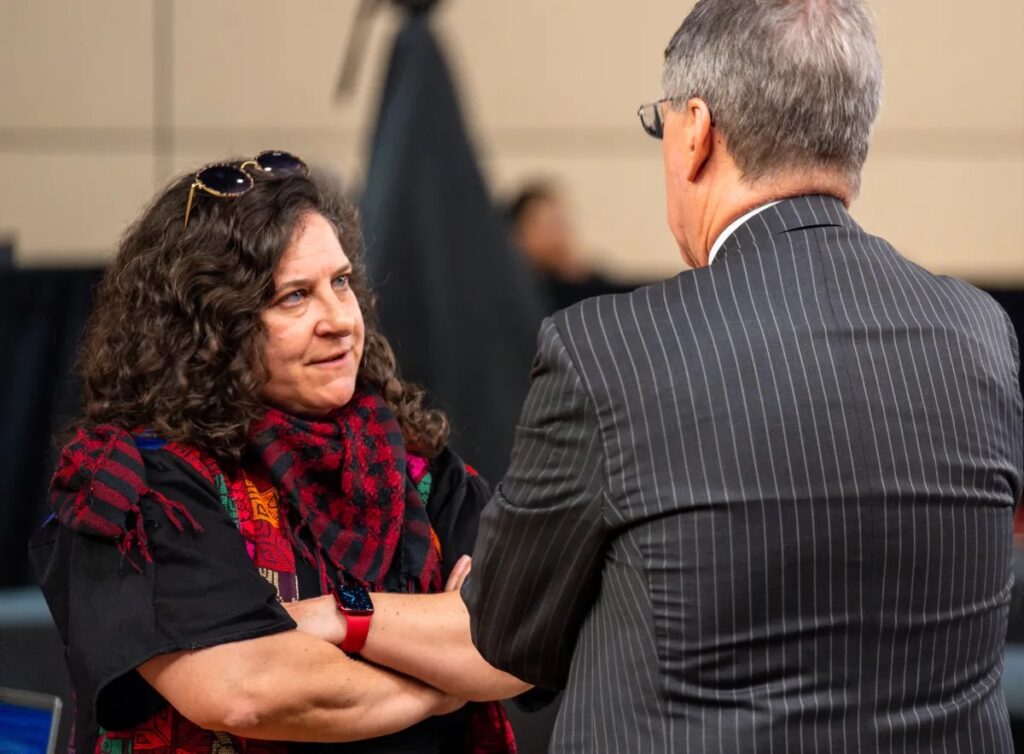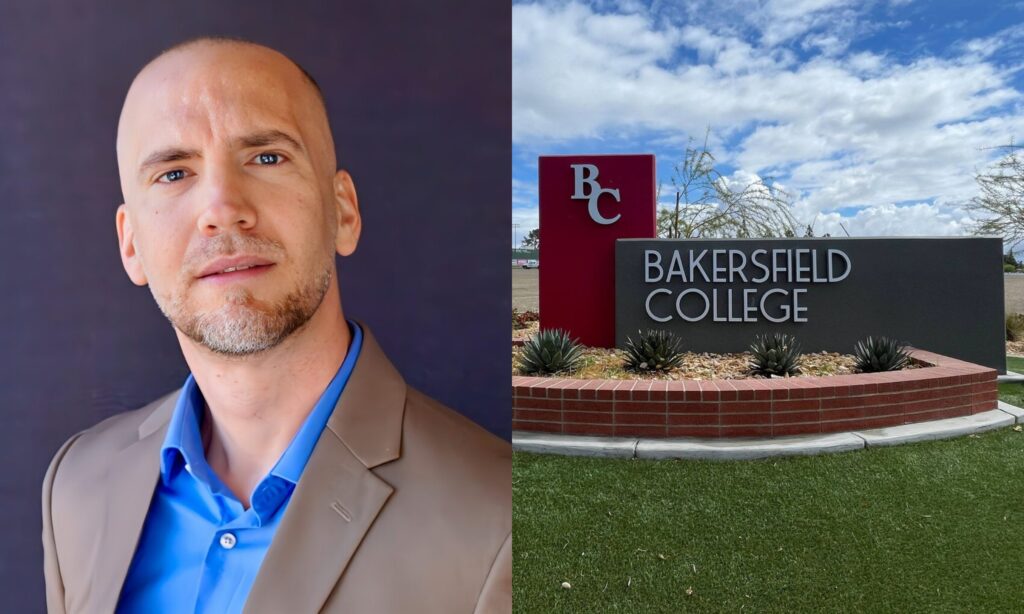
University of Arizona faculty senate chair Leila Hudson, a Palestinian American, attends a board of regents meeting at the University of Arizona last November.
Credit: Michael McKisson / Arizona Luminaria
This story was published in partnership with the Center for Public Integrity.
Leila Hudson treads carefully when discussing the Israel-Hamas war.
As a Palestinian-American and the elected faculty chair at the University of Arizona, she says she has no choice.
University policy forbids staff from using the college’s resources, including websites, computers and letterhead, to take a position on any ongoing public policy controversy, and it carries a mandate that staff who engage in political activity do so on their personal time.
So when Hudson made a statement condemning the Hamas attacks of Oct. 7 on behalf of the faculty senate, she made clear that she was speaking for herself when she said, “War crimes do not justify more war crimes. Terrorism does not justify terrorism.”
In an interview, Hudson, an associate professor in the School of Middle Eastern and North African Studies, said, “I knew that I would be subjected to a higher degree of scrutiny and attempts to invalidate my speech if I didn’t frame it as my own individual opinion. And that was very deliberate.”
In the seven months since the attacks that triggered the Israel-Hamas conflict, colleges and universities have struggled to strike a balance between defending free speech and denouncing hate speech. And as protests continue to grow on college campuses, faculty are becoming more visible, joining protests or issuing statements critical of university response.
“As of late, certainly since October 7th, I think the lines are increasingly up for debate around controversy and conversation on campuses,” said Kristen Shahverdian, program director of campus free speech at PEN America, a nonprofit that advocates for free expression.
Weeks after Hudson’s statement, the University of Arizona suspended two education professors who implied during a class lecture that Hamas is not a terrorist organization, a view that’s contrary to the U.S. State Department’s. Audio recordings of the comments went viral on social media. After weeks of student and faculty protests, the university reinstated the pair.
The University of California’s board of regents is weighing a similar policy that would prohibit faculty from using some university websites to make opinionated and political statements.
At Barnard College, a private all-women’s college in New York City, a decision to monitor and remove pro-Palestinian statements and other speech that administrators consider too political has drawn widespread condemnation.
“It’s heartbreaking. I believe in democracy, and I believe in knowledge as something that can contribute to democracy. The mission of higher education is to produce and share knowledge,” said Janet Jakobsen, a professor of women’s, gender and sexuality studies at the college.
Shahverdian of PEN America said the war has affected “many, if not most campuses” across the country.
“What we want to advise against is that knee-jerk reaction to curtail free expression,” she added.
UC mulls faculty ban
In California, the proposed policy before UC’s board of regents would prevent faculty departments from making political statements on the homepages of university-owned websites, something many faculty members say would infringe on their academic freedom. Faculty would be permitted to make statements elsewhere on the websites, with a disclaimer that the opinions don’t represent the university as a whole.
Votes on the proposal have twice been delayed to get further input from UC’s academic senate. It’s next scheduled to appear before the regents in May, though it’s possible a vote could be delayed again.
The regent driving the proposal, Jay Sures, said in an interview with EdSource that while he hopes the board approves the policy in May, he’s “not planning to rush anything.”
“We want to get it right as opposed to having the time frame dictate anything around it,” he said.
Sures maintains that the proposal protects academic freedom. He said it closely mirrors recommendations made by the academic senate in 2022, when the senate considered whether faculty departments should be allowed to make political statements.
However, the senate recommendations would allow faculty departments to share statements on the homepages of websites, as long as there is a disclaimer.
Senate leaders have called on the regents to accept their recommendations rather than create an entirely new policy. In a letter to the board, senate leaders said they are concerned that the proposed regents’ policy is ambiguous, offers “an overly broad and simplistic approach to a complex set of issues” and has the potential to limit free speech.
“Freedom of speech and of inquiry are cornerstone values of the University of California. Faculty members should have the right to express their opinions, whether as employees or subject matter experts, even if their views differ from those of peers and senior leaders,” wrote the senate leaders, UC Irvine professor Jim Steintrager and UC San Francisco professor Steven Cheung.
As the war in Gaza rages on, pro-Palestinian protests on campuses across the country — from Columbia University in New York to the University of Southern California in Los Angeles — have ramped up.
One case in California illustrates how divisive the free speech debates have become and how faculty can become entangled. In April, the dean of UC Berkeley’s Law School, who is Jewish, confronted a Palestinian student who staged a protest during a private dinner at his home. The incident, which raised concerns about antisemitism and Islamophobia, grabbed international headlines.
‘A vexing challenge’
In addition to UC, EdSource and the Center for Public Integrity contacted more than two dozen colleges and universities around the country, public and private, to ask about their policies on faculty and political speech. Just eight of the institutions replied. The responses ran the gamut, from state laws that mandate political neutrality to those that support free speech, albeit with conditions. And there was no political pattern with restrictions surfacing in blue states and red states.
Regardless of a state’s leanings, high-profile institutions are under pressure from members of Congress and national conservative leaders.
Barnard College was one of the first to create new policies restricting faculty speech after Oct. 7. The college generated headlines last fall when it removed a statement in support of Palestine from the website from the college’s department of women’s, gender and sexuality studies.
The college then made changes to its policies governing political activity and what can be published on college-owned websites. Under the policies, faculty are barred from making political statements on any Barnard website or on social media websites “bearing a Barnard name.” Faculty also can’t display signs on campus that make political statements.
A spokesperson for the college did not respond to multiple requests for comment.
“This is a vexing challenge for campus leaders right now,” said Lynn Pasquerella, president of the American Association of Colleges and Universities and former president of Mount Holyoke College, a private women’s college in Massachusetts.
To Jakobsen, the new policies are a direct attack on academic freedom. For some faculty, making statements about Palestine is a way for them to apply their academic expertise to a global issue. For example, one of Jakobsen’s colleagues in gender and sexuality studies, professor Neferti Tadiar, has conducted research into why the occupation of Palestine is a feminist issue.
“We think about things very broadly. And then we share that expertise with the public,” Jakobsen said.
UC faculty feel similarly. In their letter to the regents, the senate leaders argued that department websites are often platforms for “scholarly communications” and a place to apply academic expertise to ongoing social and political issues. “Imposing blanket restrictions on personal or collective opinions could hinder scholarly discourse and limit academic freedom,” they said.
University of Southern California’s policy does not allow use of the university’s logos, graphics or websites to express political positions. Faculty members “must be mindful when they speak or write as citizens to indicate that they are not speaking for the university, given that the public may judge the university by their statements,” the university’s faculty handbook states.
At the University of Virginia, faculty should not post political positions on university-owned websites in a manner that implies institutional endorsement or support.
The University of Chicago faculty are “free to speak or issue statements in their individual capacities, including on their individual faculty webpages hosted by their university,” a statement from the university read.
State law requires schools in the University of North Carolina system to remain neutral on political controversies. The policy extends to content on university-owned websites and social media accounts.
In a statement, the University of Michigan wrote that “freedom of speech and academic freedom are bedrock principles” but did not address whether university policy allows faculty to address political controversies on its website. After a group of students protesting Israel interrupted a cherished academic ceremony on campus in late March, administrators are weighing a policy that would penalize faculty, staff and students for activity deemed disruptive to university operations.
In a letter to the university protesting the policy, the ACLU of Michigan argued that it will “almost certainly lead to discriminatory enforcement against disfavored speech” and harsh disciplinary outcomes.
Public universities “should be especially sensitive to protecting and promoting the freedom of speech and expression of its students and faculty — especially when that speech is controversial or critical of the University,” the ACLU letter read.
As it considers its own policy, UC isn’t paying much attention to what other colleges are doing, according to Sures.
“I believe we’re the leaders in many regards, in terms of setting a policy that most people or a lot of the universities tend to follow,” he said. “So what we do is we try to figure out the best policy for the University of California, what makes sense for our campuses, and go from there.”
Most schools have policies that limit speech in some manner, said Alex Morey, an attorney who leads the Campus Rights Advocacy program at the Foundation for Individual Rights and Expression. They may make promises about freedom of expression, but at the same time, they have policies on information technology, web hosting, harassment and bias reporting, Morey noted. “So there’s all these other policies that are sometimes written in a way that conflict with those broad protections of expression and freedom.”
Pasquerella, president of the American Association of Colleges and Universities, said that while faculty can speak freely as citizens, colleges and universities do not have to provide a platform or resources for exercising free speech rights.
“Public universities have to pay attention to First Amendment rights. So I think they do have a special responsibility to promote the free exchange of ideas, the unfettered pursuit of the truth,” she said. “But there’s some responsibilities that go along with that. Your role as a faculty member in a public institution … imposes special obligations. And you’re likely to be judged not only in terms of your role as a citizen but as a representative of the institution.”
While the Foundation for Individual Rights and Expression advocates for free speech for faculty, staff and students, the organization encourages universities, administrators and trustees to remain institutionally neutral.
It urges administrators to protect speech and academic freedom in all cases. The Israel-Hamas war has made that difficult for schools because it’s such a divisive issue that remaining neutral is seen as a political move.
“The bigger the controversy, the more pressure on a university administrator, the more likely they are to be looking for a way to silence that speech rather than returning to core principles like free expression or academic freedom for controversial speech, even when it’s difficult,” Morey said.
The American Association of University Professors advises universities to involve faculty leaders when developing any policies regarding academic freedom, including those that govern political speech.
“It should not be simply unilaterally developed and imposed on the entire campus by a board or by an administrator,” said Michael DeCesare, a senior program officer with the organization.
‘Chilling effect’
Hudson, the University of Arizona faculty chair, said campus policy reasonably prevents professors from using their authority to advocate for legislation and candidates. Still, the threat of being reported for addressing public policy controversies looms for her and other faculty members.
When Hudson delivers her lectures on Palestine’s history, for instance, she has to consider if students with strong ideological opinions will file complaints that she’s breaking that rule.
In the past, advocates have pushed back against policies and decisions that clamped down on speech about Israel.
In 2015, the American Association of University Professors voted to censure the University of Illinois because it rescinded a job offer to a professor after he wrote social media posts criticizing Israel. Some donors complained that the messages were antisemitic.
The professor, Steven Salita, successfully sued the university, winning an $800,000 settlement in a case that garnered national attention. The university’s chancellor resigned in the wake of the ruling.
But that was an isolated case.
“This seems a little bit different from that because that was one faculty member and his tweets,” said DeCesare of the American Association of University Professors. “This is now at the institutional level.”
What’s troublesome to some organizations is that a different set of rules seems to apply to political speech on the Israel-Hamas war. When departments issue similar statements against police brutality, many colleges and universities don’t clamp down, said Morey with the Foundation for Individual Rights and Expression.
“They’re making subjective judgments about what’s sufficiently political and which political views do we like and want to keep up, and which political views do we want to suppress. That’s very clear viewpoint discrimination,” she said. “They can’t start deciding which political views are acceptable or not.”
The University of Arizona policy on faculty speech does not define public policy controversies, a term that could apply to a wide range of topics.
One example: Republican lawmakers in the state are pushing legislation that would allow people with concealed carry permits to bring their firearms onto college campuses. Faculty members wanted to pass a resolution in opposition to the bill, but a professor argued the body should not weigh in because of the public policy controversy restriction.
The administration suggested that it didn’t apply in the case because the legislation would impact university operations. Faculty approved the resolution.
In March, Hudson, the faculty chair, said she believes that in every state, “whether it’s red, blue or purple,” people have “a deep understanding” of the importance of free speech. But the recent crackdown by universities and law enforcement on pro-Palestinian demonstrations across the country has her questioning that assumption.
“The advance of knowledge depends on the ability to express, debate, test the unpopular, the improbable, the out-of-style topics that might enrage some people,” she said. “You need to be able to speak freely without fear or favor. That’s why students from all over the world have historically come to American universities. I hope that is still the case in the future.”

